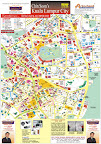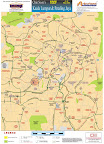Gavin Tee: Secondary Property Market in Malaysia On the Brink
COUNTDOWN: All eyes are on September as a convergence of factors come together to determine the direction of our real estate market, in particular the secondary market
by NST RED: Jan Yong
September may be a watershed month for property buyers and investors as a convergence of factors emerges which will set the tone and direction of the real estate market in the coming months. In particular, if the cooling measures by Bank Negara remain, the secondary market might be adversely affected which might eventually affect the entire economy, said Gavin Tee, a property consultant during an exclusive interview with NST RED.“The situation is dire as many people have had their loan applications rejected as banks are now assigning a lower or more conservative valuation to properties and thus offering lower loan amounts that are based on the lower valuation irrespective of the purchase price. This has resulted in the purchaser having to fork out more to make up for the difference which in many cases they can’t resulting in their having to withdraw their applications,” Tee explained.
Since the beginning of this year, there has been a significant drop in loan approvals as a result of both the 70 per cent cap on LVR (Loan to value ratio) for the third home onwards and a stricter loan evaluation process which is now based on net income instead of gross income. The drop has been estimated to be over 20 per cent compared to the same period last year, according to sources.
Aborted sales: “Lately, a lot of resale (secondary) market buyers suffered from not being able to get the fair market valuation price. Most of them could only get 60 or 70 per cent loan margin resulting in a lot of deals being called off. A lot of people lost their deposits due to difficulties in getting a loan. Imagine even if you want to buy a RM1 million house from the developer (which does not face valuation issues), you would still need to come up with cash of RM400,000. Imagine how much this would impact the secondary market,” Tee elaborated.
Tee, who is also the Founder and President of SwhengTee International Real Estate Investment Club acknowledged that compared to the primary market, it was difficult to value second hand or subsale properties but the fact remains that the Malaysian secondary market is definitely undervalued relative to markets in other countries. “While the primary market prices and global property prices have risen, our Malaysian secondary market is still moving very slowly with generally low prices. What more now with the lower valuation assigned by banks, the secondary market may slow down even more as there will be much fewer transactions.
“A lot of people want to upgrade but cannot sell their house because the buyers can’t come up with close to 50 per cent cash of the purchase price, plus extra for renovation. So it becomes mission impossible to buy in the secondary market. Buyers then go to the primary market, resulting in more units coming into the market. More new stock means prices in the secondary market become depressed.
“The situation is compounded with the 70 per cent cap on LVR and the net income policy which have definitely dampened demand. And with the general election and the Budget around the corner plus festive seasons like Hari Raya and the Hungry Ghost month, the next two months are expected to be very slow which will very likely lead to a watershed month in September when all these factors come together. In a worst case scenario, the impact which includes external weak sentiments like the Euro crisis, might even snowball into a property market crisis,” said the consultant.
Good news needed: Tee cautioned that unless the election and Budget come up with some good news, and there are some easing of restrictions in financing and valuation policies, a real estate market crisis might be looming in the horizon.
“On the other hand, if the government were to review and ease the financing restrictions, and optimism returns to the market, we may see a robust property market which is healthy for the economy.
“Banks should relax their lending policies as no new loans are effectively created in a subsale transaction. The effect is more like a transfer of loan obligations at maybe higher interest rates. So, the debt level of the nation is not so affected. If the secondary market can boom again, it would also benefit the developers because there would be more liquidity in the market which means more sales in the primary market.
“We also don’t want to see a lot of unoccupied properties or in some cases “ghost towns”, which can happen if the secondary market grinds to a halt,” the consultant added.
Noting that there are many advantages to having a robust property market, Tee said: “It gives confidence to foreign investors. It is a crucial time now to maintain our secondary market movement as our country opens up to liberalisation.
A booming property market no doubt helps fuel more foreign interest in our market. As Greater KL aspires to be a world class city and the property market becomes more globalised, it only makes sense for its property market to be in demand. More property transactions also means more income for the government in terms of the stamp duty and real property gains tax collected. This money can be used to build the infrastructure and develop the property market further, for example, financing more low cost housing.”
In summing up, the property consultant recommended that commercial banks be given the freedom like before to give loans of up to 90 per cent margin especially for second hand properties. “The government shouldn’t worry as banks are expected to practise prudent lending since it is to their own benefit,” he said.
“The valuation aspects should also be looked into, for example, speeding up the data on transacted properties. If such things are looked into, then this slowdown may be seen as just a blip and this may turn out to be the best time to invest (if you have the cash). Or you may want to wait until September when the picture is clearer.
“If the market indeed falls in September, it is likely that the upcycle will begin in March 2013 which will be the start of a supercycle when properties will boom again due to the many infrastructure and mega projects as well as other positive factors.”
http://www.nst.com.my/red/



 9:00 PM
9:00 PM
 水兴浪 Gavin Tee
,
水兴浪 Gavin Tee
,








